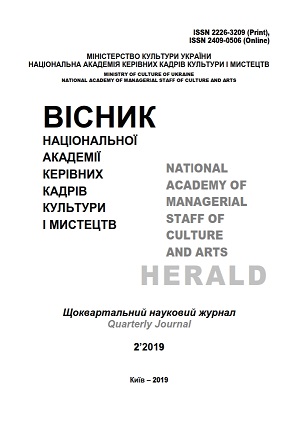Intercultural Communication as a Component of the Formation of Students’ Socio-Cultural Competence in Teaching Foreign Language in Higher Education
Intercultural Communication as a Component of the Formation of Students’ Socio-Cultural Competence in Teaching Foreign Language in Higher Education
Author(s): Oksana Anatoliyivna Kovtun, Oleksandr Viktorovich Kovtun, Nataliia Viktorivna IhnatenkoSubject(s): Foreign languages learning, Culture and social structure , Theory of Communication, Higher Education , Sociology of Culture
Published by: Національна академія керівних кадрів культури і мистецтв
Keywords: cultural space; dialogue of cultures; intercultural communication; foreign language; communicative competence;
Summary/Abstract: The purpose of the study is to reveal the content and identify the features of using the principles of intercultural communication in the process of teaching foreign languages in the educational environment of higher education. The research methodology involves the integrated use of general philosophical and cultural approaches to the realization of the goal of scientific intelligence and a set of linguistic, pedagogical and sociological methods. The scientific novelty of the results lies in the study of the important problems of intercultural communication as a theoretical and methodological basis for students of teaching foreign languages in higher education. Conclusions. Knowledge of the specifics of communicative behavior avoids communication errors and is an important aspect of teaching a foreign language. Studying foreign languages, it is necessary to pay attention not only to the grammatical and lexical composition of the language, but also to the verbal and non-verbal influence of communication. The importance of studying the culture of another nation is beyond doubt. By experience, it is well known that foreign language speakers tolerate speech errors, but often cultural errors are different – they have a negative impression on them, even subconsciously. Thus, a student needs to know the peculiarities of the mentality and culture of a foreign-language socio-cultural group and to understand the importance of using this knowledge in a specific socio-cultural context. One of the best proposals for creating a situation of intercultural communication in class, in our opinion, is using role-playing games in foreign language lessons, where it is possible to «try on» a particular controversial situation and realize itself as a source of conventions adopted in a particular society. Thus, intercultural communication is based on accepting differences, exploring the possibilities of communication, bringing up a new perspective on reality, perceiving a different mentality – everything that is beginning to be perceived as «cultural meaning» in the process of intercultural communication.
Journal: Вісник Національної академії керівних кадрів культури і мистецтв
- Issue Year: 2019
- Issue No: 2
- Page Range: 236-239
- Page Count: 4
- Language: English

